The Bird Ecology Lab is assigned to the Marine and Limnological Sciences Institute at Universidad Austral de Chile. Our research team, led by Dr. Juan G. Navedo, is composed of a permanent staff of two professionals, together with undergraduate and graduate students, plus postdoctoral researchers, motivated to contribute to society with knowledge regarding the natural history and ecology of Nearctic and Neotropical birds. Our work is based on experimental approximations, applied research, and long term monitoring programs, mainly with tagged birds. By 2018, we have collected samples from more than 3,000 birds (44 species).
Additionally, our lab contributes to the generation of leading-edge knowledge, and the training of advanced human capital, with scientists from different labs, universities and other institutions, doing research on the Eastern Pacific flyway, where the Chilean territory is located, and also other flyways worldwide. Specifically, we collaborate in the Global Flyway Ecology project, led by Professor Theunis Piersma
Director
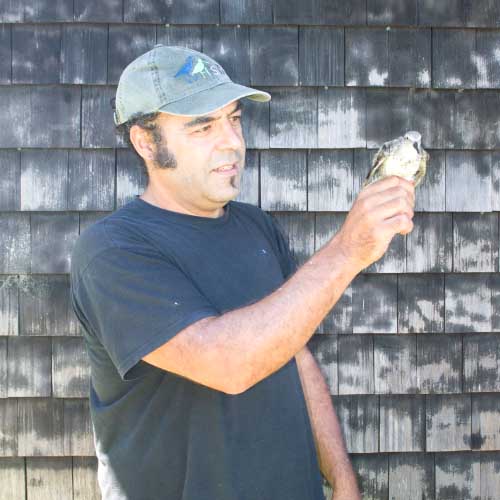
Juan G. Navedo – Director
Academician, Associate Professor at the Institute of Marine Science at Universidad Austral de Chile (UACh), Mr. Navedo received his education as Biologist from Universidad de Oviedo (Spain), and is a Doctor in Marine Science and Technology from Universidad de Cantabria (Spain). His main research focus is on migratory birds, with an emphasis on shorebirds. He runs multiple projects in basic science, applied research, and monitoring, with different bird species as models for study. He also collaborates with a broad network of national and international scientists, formally participating in the Global Flyway Ecology project.
Read More
Head of the Bird Ecology Lab, and Director of the Quempillén Experimental Station, in Ancud, Chiloé (Chile), home of AustralAVEX experimental aviaries designed and equipped with leading edge technology, which allows for advanced research, mainly in the disciplines of ecophysiology, ecotoxicology, and behavioral ecology. Within UACh, he is part of the Faculty Board in different Graduate Programs, is a member of the Marine Biology School Council, and also of the Bioethics Subcommittee for the Use of Animals in Experimentation.
He is also a member of the Editorial Panel at the Journal for Nature Conservation, as well as performing as occasional Copy Editor at publications such as Animal Conservation, Aquatic Conservation, Behavioural Ecology and Sociobiology, Biological Conservation, Bird Conservation International, Ecological Modeling, Ecology and Evolution, Journal of Applied Ecology, Journal of Wildlife Management, PLoS ONE, Science of the Total Environment, among others. Currently, he is also an elected member of the Arctic Migratory Bird Initiative (AMBI) – Planning Group 4 (Reducing the threat of rice crops and shrimp farming in South America).
Office & Lab: Facultad de Ciencias, Campus Isla Teja s/n, Valdivia, Chile
AustralAVEX: Estación Experimental Quempillén, Ancud, Chiloé, Chile Telephone: +56 63 2 292550
Email: jgnavedo (at) uach.cl
Team
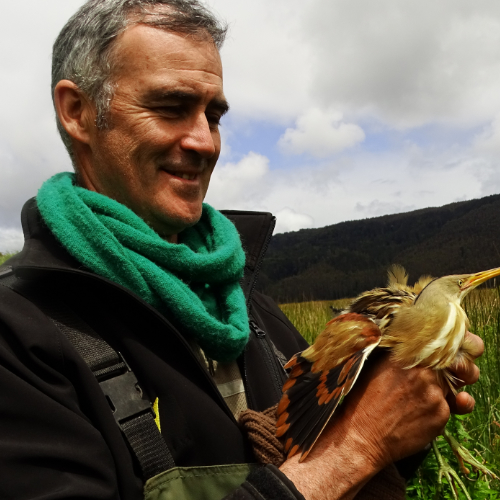
Jorge Ruiz T. – Ornithologist
A Veterinarian from Universidad Austral de Chile, Mr. Ruiz is a renowned ornithologist in Chile, and has dedicated his life to nature conservation, especially around birds and mammals from maritime ecosystems and humid zones. Other areas of interest include research on introduced species and their impact, and wildlife observation as a tourist activity (Special Interest Tourism) and a tool for conservation. He is currently Chief Ornithologist at the Lab, in charge of fieldwork execution in all active projects.
Read More
A professional wildlife illustrator, he has designed and elaborated numerous environmental divulgation and educational materials, for diverse projects and institutions. Special select publications include the book “Aves de Chile – Sus Islas Oceánicas y Península Antártica. Una guía de campo ilustrada” (Chilean Birds – Oceanic Islands and the Antarctic Peninsula, an Illustrated Field Guide), and others such as “Aves Rapaces de Chile” (Chilean Birds of Prey), and “Guía de campo de las aves y mamíferos marinos del Sur de Chile” (Field Guide of Marine Birds and Mammals in Southern Chile).
Lab: Facultad de Ciencias, Campus Isla Teja s/n, Valdivia, Chile
Telephone: +56 63 2 292550
Email: jorgeruiz00 (at) gmail.com

Gabriela Biscarra – Scientific assistant
Conservation and Natural Resources Management graduate, and M.Sc in Forest and Environment, Universidad Austral de Chile. Has a NABC ringing certification. Scientific assistant specialist in bird ringing and responsible for improving bird handling and processing techniques at capture. Involved in most projects from the lab, particularly in the ones with the Green-backed firecrown Sephanoides sephaniodes as model species.
Read More
Gabriela did her M.Sc project evaluating the early response in two bird species after management of a secondary forest in the south of Chile. Led the EXPLORA project (scientific-educational) titled “Abramos Nuestros Laboratorios” (spanish for let us open our laboratories). In 2018 joined a team that updated census estimates of tropical bird fauna in a forest part of the Manu National Park, Peru.
Lab: Facultad de Ciencias, Campus Isla Teja s/n, Valdivia, Chile
Telephone: +56 63 2482157
Email: gaby.biscarra(at)gmail.com
Postdoctoral Researchers

Natalia S. Martínez-Curci
A Biologist and Doctor in Biological Sciences from Universidad de Buenos Aires, Argentina, Ms. Martínez-Curci is currently a Postdoctoral Researcher at the Coastal Solutions Program, from Cornell Lab of Ornithology (USA) and Universidad Austral de Chile.
Read More
Her work has focused on research and conservation projects in coastal ecosystems in South America, studying primarily the ecology of aquatic migratory birds, considering trophic aspects and habitat usage patterns in different spatial and temporal scales. To date, she has published over ten articles, including publications in SCI magazines, book appendixes and chapters in the fields of ornithology, ecology, and biodiversity conservation. She is currently a postdoctoral fellow in the Coastal Solutions program (www.solucionescosteras.org). In that context, she carries out research regarding the distribution, abundance, trophic requirements, and physiology of shorebirds who spend their non-reproductive periods in Chiloé, in association with the Lab, and focusing on the potential effects of marine algae farming and collection. These studies will be the basis to generate an adaptive management model that makes it possible to reduce the impact of aquaculture on shorebirds on a global scale.
Email: nanusmc (at) gmail.com
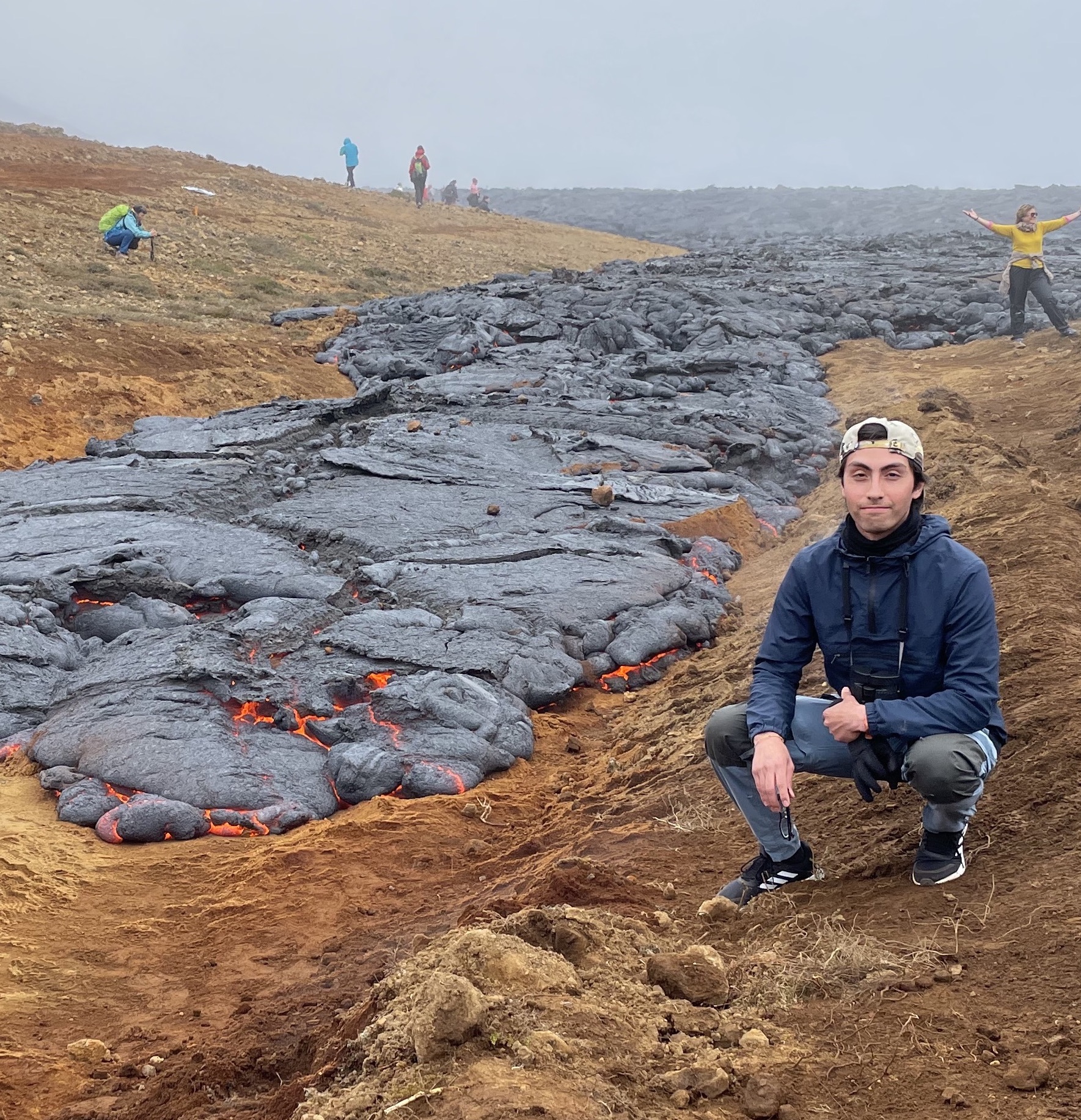
José O. Valdebenito
PhD in Biology, University of Bath, UK.
DVM, Universidad de Concepción, Chile.
His research line tries to understand why female birds die at higher rates than males, in the wild.
Read More
Sex-specific mortality patterns have been well described in some animals groups such as mammals, where several organismal and life-history variables explain why females tend to survive better than males. In birds, however, despite knowing for decades that males survive better than females in the wild, we still don’t the drivers of it.
I have addressed this question from several perspectives, including theoretical approach using variables such as sex ratios, mating systems, sexual dimorphism, etc., as well as proximate variables including mostly parasite infection and immunology.
An important part of my work involved phylogenetic comparative methods and meta-analysis, however more recently I have been focussing on species-specific model studies, i.e. shorebirds.
I was involved in an ÉLVONAL project, funded by the Hungarian government that tried to understand the associations between sex-roles and population demography, and everything in between, in shorebirds. Recently I led an INTERACT project trying to link mating system theory with sex-specific immunity using shorebirds in Iceland. Currently I am a FONDECYT postdoctoral fellow(2022-2025) at the Universidad Austral de Chile, leading a project on the Two-banded plover (Charadrius falklandicus) to investigate the trade-offs between attraction investment and immune function. This project is in association with the Centro de Humedales Río Cruces (CEHUM) and the Bird Ecology Lab, Universidad Austral de Chile.
Though the majority of my work has been conducted on shorebirds, I am happy to apply these intriguing theories to other model systems.
Key words: immunology, transcriptomics, DEG, meta-analysis, phylogeny, wader.
email: j.valdebenito.ch (at) gmail.com
Doctoral Students
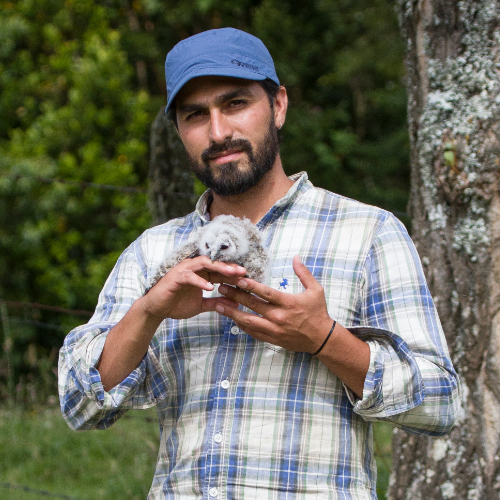
Enzo Basso
A Veterinarian from Universidad Austral de Chile, Mr. Basso has worked as a volunteer in diverse rehabilitation centers, where he acquired experience in wildlife management.
Read More
He joined the Lab towards the end of 2014, interested in obtaining scientific tools to take on issues that relate to bird ecology and conservation. In this context, he participated in the Master’s of Science program at UACh, with a specialty in Applied Ecology, working in a research project with Nearctic migratory birds, in Mazatlan, Mexico, financed by Environment Canada. He is currently a CONICYT fellow, in his first year as a PhD candidate, with a specialty in ecology and evolution, at UACh. He has began developing his doctoral thesis on factors relating to time-space connectivity and interaction between predator and prey in long-distance migratory bird populations, using the Hudsonian Godwit Limosa haemastica as a model for study.
Email: ebassoq (at) gmail.com
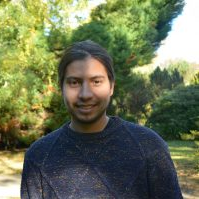
Jonathan Vergara Amado
Read More

Valeria Araya
Marine Biologist, she is currently studying a doctorate in Marine Biology at Universidad Austral de Chile.
Read More
She has been part of the Lab since 2016. She did her undergraduate project on the effect of antibiotics commonly used by salmon farms on the gut microbiota of Hudsonian godwit (Limosa haemastica) in Chiloé. She also has contributed to several fieldwork activities and science outreach. Among the fields that most interest her highlight ecology, migration and conservation. Currently she is developing her doctoral project on factors that determine partial migration in waders of the southern cone.
email: vale.arayag(at)gmail.com
M.Sc Students

Simón Maldonado
Marine Biologist, Universidad Austral de Chile. Currently studying a MSc in Applied Ecology at the same university. He is supported by a scholarship from the Millennium Institute Biodiversity of Antarctic and Subantarctic Ecosystems (BASE)
Read More
He did his undergraduate project at the Bird Ecology Lab, studying the ecological aspects of staging prior migration of the Rufous-chested dotterel, a Neotropical shorebird. Currently he is studying a MSc focussing on the effects of parasite infection along the annual cycle of the Rufous-chested dotterel and the Two-banded plover, two Neotropical shorebirds that breed in the far south of the Southern Cone.
email: simonmaldonado.oyarzo(at)gmail.com
Undergraduate Students
 María Fernanda Sanchez. Recently became a member of the lab as a Marine Biology undergrad student. She did an internship in songbird and shorebird handling and capture techniques at Universidad de Extremadura, Spain, supported by a Santander Mobility Grant. She has great interest for continuing research on survival and physiology of migratory shorebirds. Currently she conducting her final year undergrad project using molecular techniques for helminth detection in Limosa haemastica.
María Fernanda Sanchez. Recently became a member of the lab as a Marine Biology undergrad student. She did an internship in songbird and shorebird handling and capture techniques at Universidad de Extremadura, Spain, supported by a Santander Mobility Grant. She has great interest for continuing research on survival and physiology of migratory shorebirds. Currently she conducting her final year undergrad project using molecular techniques for helminth detection in Limosa haemastica.
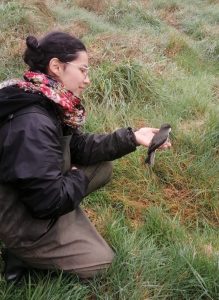 Martina Jara. Marine Biology student, Universidad Austral de Chile. Currently conducting her final year undergrad project which compares two methods for determining presence of Passeriformes in a wetland: eDNA metabarcoding and mist netting.
Martina Jara. Marine Biology student, Universidad Austral de Chile. Currently conducting her final year undergrad project which compares two methods for determining presence of Passeriformes in a wetland: eDNA metabarcoding and mist netting.
Alumni
 Juan Joannon. Marine biologist, Universidad Austral de Chile. Defended his undergrad project in 2023, titled “Efectos de la presencia de personas y perros sobre la densidad y actividad de forrajeo del Zarapito Común (Numenius phaeopus hudsonicus) durante el periodo de sobreveraneo”.
Juan Joannon. Marine biologist, Universidad Austral de Chile. Defended his undergrad project in 2023, titled “Efectos de la presencia de personas y perros sobre la densidad y actividad de forrajeo del Zarapito Común (Numenius phaeopus hudsonicus) durante el periodo de sobreveraneo”.
Guillermo F. Calderón Ormeño. Marine Biologist, Universidad Austral de Chile. Defended his undergrad project in 2024, which studied dietary changes in the Black-necked swan (Cygnus melancoryphus) during different periods in spring-summer in the Cruces river sanctuary.
 Dra. Camila Gherardi. Former PhD student at BEL. Currently doing postdoctoral research at Universidad Andrés Bello, Chile.
Dra. Camila Gherardi. Former PhD student at BEL. Currently doing postdoctoral research at Universidad Andrés Bello, Chile.
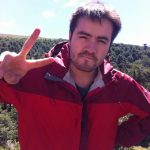 Gonzalo Torres-Fuentes. Veterinarian, Universidad de Concepción. Received his M.Sc in Applied Ecology in 2022.
Gonzalo Torres-Fuentes. Veterinarian, Universidad de Concepción. Received his M.Sc in Applied Ecology in 2022.
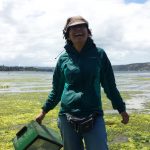
Dra. Sara M. Rodríguez. Former postdoctoral fellow at the Instituto de Ciencias Marinas y Limnológicas, Universidad Austral de Chile.
Claudia Valle.A Biologist from Universidad de Barcelona (Spain) and Universidad Austral de Chile, she defended her undergraduate thesis in 2017, analyzing wetland habitat quality for assembling passerine birds.
Candela Berenguer. Marine Biologist from Universidad de Cádiz (Spain) and Universidad Austral de Chile, she defended her undergraduate thesis in 2016, estimating the daily intake rate of prey in the Hudsonian Godwit Limosa haemastica, in two bays in Chiloé.
Nadja Bello. Marine Biologist from Universidad Austral de Chile, she defended her undergraduate thesis in 2015, analyzing macrobenthos communities and their function as food for shorebirds, in two bays in Chiloé.

